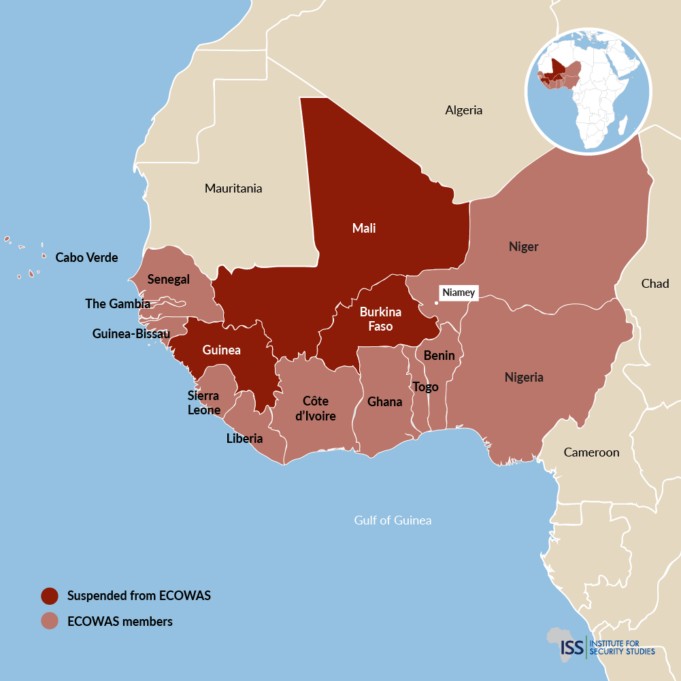Conflating numerous events that appear dissimilar is how Africa in 2023 must be viewed. South Africa’s BRICS economic summit, the country’s stance on Israel’s incessant bombing of Gaza as “genocide,” the coup d’états in seven African countries, which have been described as a sign of failed democracies, are just a few of the major events that impacted the Motherland this year.
According to a report in the Daily Maverick, censuring leaders for coups is only a first step.

Businessday.ng, a Nigerian business and financial news website, describes seven countries experiencing “military interregnum,” including Guinea, Burkina Faso, Mali, Niger Republic, Chad, Sudan, and Gabon, as having a “lack of purposeful leadership.” With many citizens on the continent being crowded out of the dividends of democracy, military leaders are exploiting disenchantment with democratic leadership amid deteriorating economic conditions, the website noted.
African and international actors must tackle the poor quality of democracy and governance. The debate about democracy and governance in Africa must evolve as 2023 brought these issues to light. “Priorities (should be) shifted to the quality of electoral processes, the value of term limits, but also legitimacy, performance, and accountability in political and economic governance.
Social discontent, largely expressed through protest, has (in the past) been met with varying degrees of suppression, co-option, and consolidation of the status quo,” noted the Institute for Security Studies.
This pattern of reacting to military takeovers with optimism, is an expression of deep-seated frustration with civilian leaders in Africa, some experts argued. TRT-Afrika reported that the consequences are that regardless of the suggested sanctions and postponed intervention by U.S.-backed ECOWAS (an economic coalition of West African countries),
“The new military alliance among the West African countries of Niger, Mali and Burkina Faso has sparked a major shift in the subregion that has the potential to have an impact not only on the importance of ECOWAS but also on the lives of people in that part of the continent.”
If you listened in September to African leaders addressing the United Nations General Assembly (UNGA-78) as I did, beginning with why don’t the 54 African states have a permanent seat on the UN Security Council, you would have discovered a singular unanimous message of being fed up with Western powers’ dominance over global affairs.
In unison, African leaders expressed dissatisfaction with living in a world that pretends present-day economic and social conditions are not connected with historical injustices.
In his address, Ghana’s President Nana Akufo-Addo blamed Africa’s present-day challenges on “historical injustices” and called for reparations for the slave trade. President Cyril Ramaphosa of South Africa and a member of BRICS said the continent is poised to “regain its position as a site of human progress” despite dealing with a “legacy of exploitation and subjugation.”
Economist Redge Nkosi is the Pretoria-based founder and executive director of First Source Money and Public Banking of South Africa. He told Africa Watch, that what the continent and the Global South needs is to decouple from the western Bretton Wood imperialist model. Global South countries include all African countries and according to worldpopulationreview.com, there are a total of 78 countries in the Global South, including China, Colombia, and Cuba.
Nkosi is also a former member of the Nelson Mandela administration and was a presenter at the 2023 BRICS summit. “De-dollarization and the construction of a new global financial monetary architecture” was the substance of his talk.
“The Global South countries are sick and tired of the hegemony and the abuse of the hegemony led by the U.S. and Europe,” he said. “And we’re determined to ensure that institutions like the IMF (International Monetary Fund) and World Bank become as obsolete as they are destined to become.”
He said the system they proposed at the BRICS summit was consistent with the global system they are wanting to put in place. This new global monetary system will reflect the dynamics of “countries across the world … not Europe and the U.S.”
Nkosi added that the Global South sees the handwriting on the wall. “Whether it’s Europe or the United States, they are going to fight to reverse these new initiatives. These are the last breaths of a dying horse.”
Nkosi looks forward to a world run fairly by countries in a democratic way. Western economies are dying economies, said Nkosi. And, if you read the financial pages they are coming to grips with this very fact. He added that historically the West has exploited the mineral and natural resources of the Global South.
The Global South has almost simultaneously awakened to their greed, corruption and exploitation and are now in the process of “decoupling from Europe and the United States,” Nkosi added.
Follow @JehronMuhammad on X, formerly Twitter













